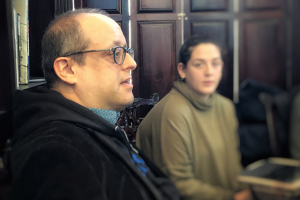At the intersection of journalism, data, software and design

by Barbara Wiedemann
Data wrangler and team leader Scott Klein, who directs a group of journalists and programmers as the deputy managing editor of ProPublica, visited UNC Hussman School of Journalism and Media on Thursday, Feb. 27, at the invitation of faculty member Ryan Thornburg, who teaches data-driven journalism.
Klein describes his work as planting a stake at the intersection of journalism, data, software and design.
Hussman students, faculty and staff heard from Klein about his team’s integrated approach to the news, learning how a nonprofit newsroom engages a digital audience and broadens its reach via partnerships; how the New York City-based organization uses data and computational techniques to find and tell stories; and how the journalists and programmers on Klein's team build large, interactive software projects that make national statistics and journalistic stories come alive for readers and their communities.
“It’s been a long-standing goal of mine to pay a visit to UNC’s journalism school,” said Klein. “Having met graduates from UNC over the years, I got the sense that the program places a high value on creative as well as critical thinking, so I wasn’t surprised when I met smart students who asked great questions and discussed exciting projects.”
Journalism and programming entwine
Klein delved into 19th-century British poetry as an English major at Clark University. His interests in journalism and programming entwined and eventually led him to an executive position at The Nation, with oversight of that weekly progressive magazine’s online presence for nearly a decade beginning in 1998, when such endeavors were still considered “new” media. When original benefactors Herbert and Marion Sandler committed $10 million annually to long-form investigative journalism and hired former Wall Street Journal managing editor Paul Steiger to run the new ProPublica newsroom, Klein was all-in. He was one of the first 10 hires back in March of 2008 and has moved from senior editor for news applications to assistant and now deputy managing editor roles. Along the way, he co-founded DocumentCloud in 2009, which is used today in hundreds of newsrooms to share millions of documents with their readers.
“It's a remarkable place to work,” Klein noted about ProPublica, the first online news source to win a Pulitzer Prize, back in 2010. ”I’m blessed to be there.” But he quickly added that students have a lot to gain by learning the ropes doing quick-turn stories elsewhere, the kind of stories that drop them into unfamiliar territory without sources or background—to learn fast about how to find contacts and data and of equal importance, how to answer the question, “When do I have enough. When am I ready to write?"
Tools of the data-driven trade
A team of talented students peppered Klein with questions about investigative reporting today. From Daily Tar Heel Co-Editor-in-Chief Emily Siegmund ’20, whose interests include alternative forms of news storytelling; to Argentinian-born Lucia Castro ’20, whose focus is on international data journalism; to A.J. O’Leary ’20 and graduate student and Pruden Fellow Anne McDarris, who share an interest in data-driven science stories; students all expressed a fluidity with the final form their reporting will take—whether it be in print, online, or over broadcast or radio channels or multiplatform, affirming their position as the first generation to have grown up as digital news natives.
“How do you accumulate and share data?” asked sophomore Elizabeth Moore ’22, currently a student in Thornburg’s “Data-Driven Journalism” class.
Klein answered that public records requests may be the 150-person nonprofit’s most frequent source of data. He also cited available federal repositories of information provided by organizations like the Environmental Protection Agency or Health and Human Services; and talked about team members who create their own data sets. He described engagement projects like Documenting Hate for which ProPublica and its partners reached out to the public for data, asking their readers to get in touch and tell their own stories.
Savannah Norris ’21—who has worked in radio for Carolina Connection and like many of the gathered students, is in Eric Ferkenhoff’s “Advanced Reporting” class this semester—talked about an ongoing investigation into corporate pricing that she’s working on under Ferkenhoff’s guidance. Klein cited it as a potential for the engagement-type data he’d described, where community members document incidents and journalists fact-check them and bring them into a data pool that becomes the basis for further reporting. Confirming the integrity of the data first is key, he advised, and then searching it for extremes, outliers, clusters or other noteworthy statistical trends.
“A huge percentage of data journalism starts with putting things in columns,” said Klein.
“I was interested in hearing Scott Klein’s take on how we can best prepare our students,” said faculty member Andy Bechtel. "He talked about having numeracy skills and being able to bring an academic paper or scientific study to life as a news story. Those are the kinds of things we aim to do at UNC Hussman.”
For additional information:
Prestigious Pulitzer, Peabody and George Polk awards went to Scott Klein’s ProPublica colleagues in 2019 for their coverage of the Trump Administration’s family separation policy. Awardees included reporter Topher Sanders, co-founder of UNC Hussman’s Ida B. Wells Society for Investigative Reporting. Learn more about Sanders and the Ida B. Wells Society here.